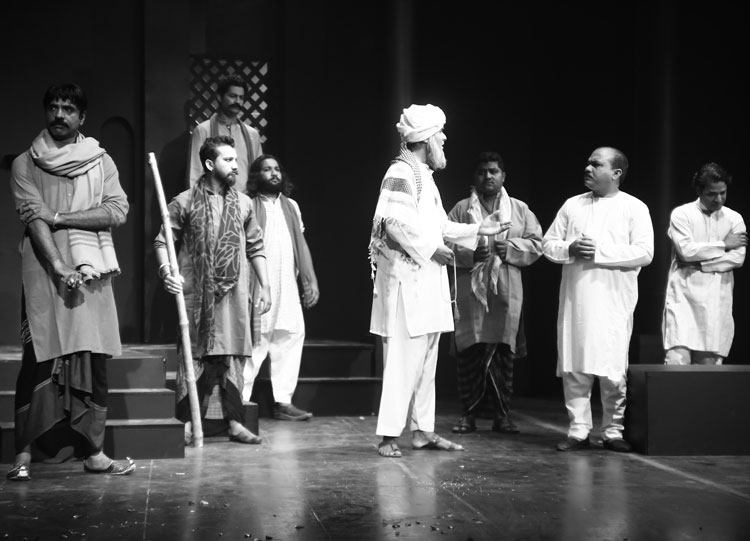Written by: Hala Syed
Posted on: March 22, 2019 | 
(L-R) Harris Khan as Javed, Mehmood Bhatti as Mirza Sahib, Sheema Kermani as Maaji and Samaviya Asghar as Mirza's wife
For a play written in the 1980’s, Jinnay Lahore Naee Vekhya remains extremely relevant to our times. A poignant tale about community, religion and the homeland, it presents insightful commentary on the emotional toll caused by the Partition of India in 1947.
Originally written by acclaimed Hindi novelist and playwright Asghar Wajahat, this iteration was produced by cultural action group Tehrik- e-Niswan, as part of NAPA’s International Performing Arts Festival. Adapted by Anwer Jafri, the play was directed by him and Sheema Kermani, while the latter also had a starring role.
Kermani played the role of an elderly Hindu woman, who has been left behind in Lahore after the Partition, and was referred to as Ratan Johari’s mother or later simply as “Maaji.” She has lost her family in the war, and cannot bear to lose the only home she has ever known. Enter the Mirza’s: a Muslim family transplanted from Lucknow, who have been living in refugee camps and are finally allotted Ratan Johari’s house. To their consternation, the current occupant, ‘Maaji,’ refuses to budge, but is willing to share her house with them.
Each of the family members reacted differently to this situation. Mirza Sahib (Mehmood Bhatti) looks for legal channels through which he can evict Maaji, his wife (Samaviya Asghar) tries to reason with her and convince her to leave on her own, their young daughter Tanno (Abeera Pervaiz) guilelessly befriends her, and her hot-headed brother Javed (Harris Khan), escalates the tension by seeking help from a local gang who say they will “take care” of Maaji.
This gang of goons and lowlifes (Imran Khan, Umair Aslam, Dawood Bhatti and Kumail Bhatti) want to murder the old lady, so that they can have control of her property. They feel entitled to the land in Pakistan because they were born Muslim, and believe a “kafirah” has no claim to Pakistani soil, despite the fact that she has lived in Lahore her entire life. When they plead their case to the local moulvi (Mohammad Anwar Uddin), he takes her side instead, which surprises and angers them. This gang of boys, under the garb of protecting Islam, but preaching intolerance, regard the use of violence in evicting Maaji as perfectly permissible.
The performances were excellent across the board, with a range of acting styles coming together seamlessly. The loud brash ranting of the gang contrasted with the quiet helplessness of Mehmood Bhatti’s Mirza, were a sight to behold. Especially when Bhatti’s initially hesitant demeanour gave way to steadfast steeliness, when required. Samaviya Asghar was all warmth and maternal instinct, whether she was interacting with her daughter or sharing her woes with Maaji. Waheed Ali as the poet Nasir Kazmi, brought an altogether different energy to the piece: musing, philosophical and nostalgic as he waxed poetic at the Chai stand with the Chai Wala (Adnan Haroon) and Tangay Wala (Sonu Imran Bhatti), both of whom were sources of comic relief.

The musical transitions of Nasir Kazmi’s poetry, as performed by Daniel Wilayat and accompanied by Zulfiqar Ali on tabla, elevated the level of this production which had a simple set, and a very straightforward storyline. The story proceeds as you’d expect it to, but what it lacks in narrative dexterity, it more than makes up in clarity of message and strength of conviction.
Jinnay Lahore Naee Vekhya is about more than the Partition. Sheema Kermani’s character epitomizes the values of empathy, sharing and love. Her heartfelt performance won over the audience, just as it was winning over the family and the neighbourhood. By welcoming immigrants into her home and sharing her love for Lahore with them, she became a part of their home.
The audience nodded along with the Moulvi’s speech about respecting people and their faith. We all know these ideas to be true, but often abandon them in our penchant for nationalism, religion or whatever ideology we convince ourselves we need to protect. Jinnay Lahore Naee Vekhya questions that.
You may also like: